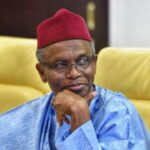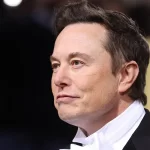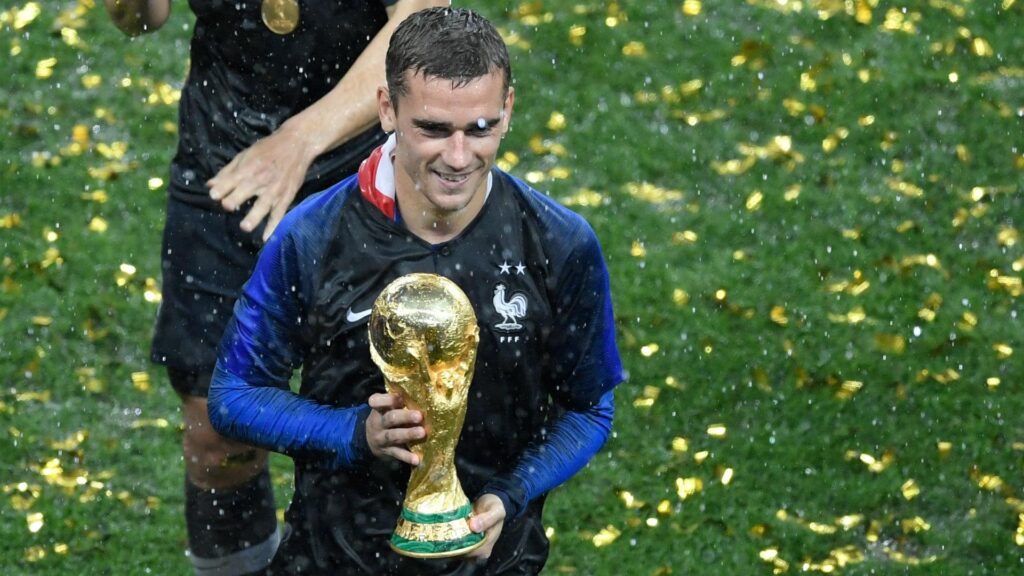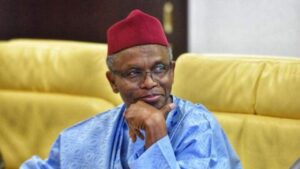Not all of the beaten Bleus headed for the tunnel of the Parc des Princes at the final whistle of France’s 3-1 defeat by Italy on 6 September. One of them, Antoine Griezmann, trotted around the whole periphery of the pitch on his own to applaud the crowd. We did not know then, as he must have done, that his 136th appearance for Les Bleus – there’d be a 137th three days later in Lyon, an 11-minute cameo against Belgium – was his last chance to say adieu in the French capital. There was no need for fireworks. No video of his finest moments in blue would be shown on a giant screen, no memento would be given to him in the centre circle. All he desired was a last, private moment of communion with a French public to whom he’d given so much, but which is only starting to appreciate how good he was. No, not “how good”. How great.
This will seem absurd. France have taken part in three major finals over the past eight years, and Griezmann could lay a claim to have been the best player – not just for France, but overall – in each of these tournaments. Yet fewer French people than you think would put him in the top five of the men who put on the blue jersey. Zinedine Zidane would be fighting for top spot with Michel Platini, which seems about right, given how both came to be associated with the first triumphs of the national team they captained. Qatar 2022’s Golden Boot winner Kylian Mbappé, though still only 25, would be a natural choice for younger fans.
At the opposite end of the generational spectrum, Raymond Kopa would get a mention, as the first of our footballers to become recognised beyond our borders and win the Ballon d’Or. Thierry Henry, the serial record-breaker who never quite won over French hearts, would be mentioned. Didier Deschamps, the water-carrier whose bucket never went empty, would deserve to be in contention if influence counted for more than goals; Just Fontaine too, that comet which crossed the sky all too briefly, whose World Cup goalscoring record will surely never be beaten.
But Griezmann? I doubt it, even if the announcement of his international retirement will have given us a chance to pause, reflect and reconsider. One of the main reasons for this bizarre lack of appreciation is that everything he achieved, and that is plenty, he had to fight for. Usually, triers who “make it” get the popular vote. But Griezmann is unique in that it’s not the lack of talent, or skill, which made him a “trier”. Heaven knows he had talent and skill to spare, and more besides. It is that, in his mind, his personal achievements always came second to the achievements of the team he’d fought to be in. He was too good to be a trier, yet a trier he was and will remain to the day Atlético Madrid’s most prolific goalscorer also calls time on his club career. It is one of the many paradoxes which Griezmann managed to reconcile throughout his career, but which affected the perception and judgment of others.
Here is another of those paradoxes. The two managers with whom he’ll always be associated, Deschamps and Diego Simeone, place tactical discipline and combativeness at the very top of footballing virtues. Yet Griezmann, the most agile of minds to go with the nimblest of feet, never rebelled against their rule, when others would have felt it stifled their creativity. More than that: he found joy in playing an attritional style which he admitted – with a smile, as usual – was “a pain in the … to watch” (“on est chiants à regarder”). If there was joy to be found, and none was obviously at hand, he’d bring it to the table himself.
He also played his football in an age when it became normative, and you can’t paint a Griezmann by numbers. No metrics have been defined which can gauge a player’s intelligence or commitment. Statisticians, as well as a growing number of fans, focus instead on the measurable impact of both qualities on the pitch. Interceptions, assists, blocks, goals, high-intensity sprints? Griezmann was never found wanting in any of these departments, but it mattered less than the rest, what made Grizi, Grizi.
He was capable of the most delightful touches, but eschewed the spectacular if the mundane would bring a better outcome. He could do everything; he could play in any position. He took France to the finals of Euro 2016 and the 2018 World Cup first as a right-winger, then as a second striker, and, in Qatar, morphed into a deep-lying playmaker of such grit, imagination and radiance that you wondered if it shouldn’t have been his role all along. Not even Olivier Giroud headed the ball as hard and as precisely; and no one in the French camp struck it as sweetly – and powerfully – as he did with the outside of his right boot, as if it were the most natural thing in the world. If every ball is a question, almost every time Griezmann found the answer.
But he was more than all this. He lit up French football when it was still struggling to emerge from the darkness of Knysna at the 2010 World Cup. Together with Hugo Lloris, Giroud, the Paul Pogba of Les Bleus, N’Golo Kanté and Raphaël Varane, he made disillusioned fans fall in love with their national team again. It is fitting that the record he set, surely never to be beaten, is to have played 84 consecutive games for France, between August 2017 and November 2023, because there could be no better demonstration of his absolute dedication to the cause.
But that race is now run. There will be no 138th cap and no 45th goal for France, when it was taken for granted that Griezmann would carry on and turn up for his fourth World Cup in 2026. Perhaps he felt that, having started the semi-final of Euro 2024 against Spain on the bench, he no longer was an automatic starter for Deschamps. Perhaps being overlooked for the captaincy when Lloris retired and Mbappé was picked instead played its part. The only certainty is that France have just lost one of their all-time greats and will now find out what Deschamps really meant when he said that while “no one [was] irreplaceable”, Griezmann “over the years, had ensured he would be indispensable”. But wasn’t he both?










More Stories
Robin van Persie is appointed new manager of Dutch giants Feyenoord
Newcastle hold off Nottingham Forest as Isak double edges seven-goal thriller
Premier League: 10 things to look out for this weekend